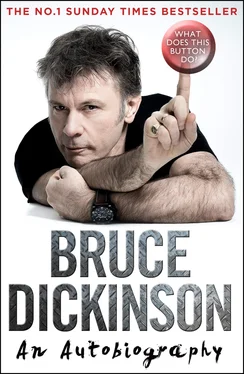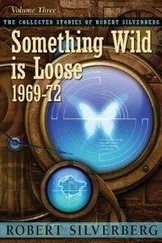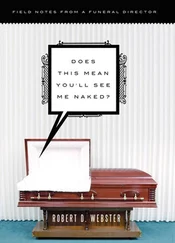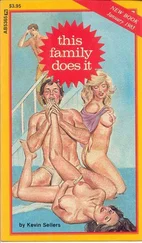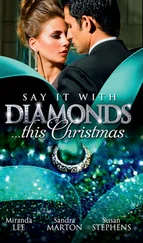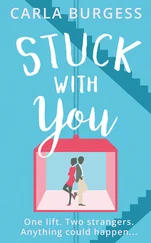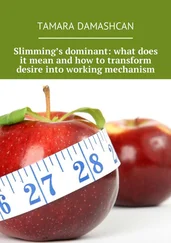‘Fuck off, you twat,’ was the robust response.
At home in Sheffield I was enrolled in the Christian Union, where I wore a little badge and was encouraged to read The Screwtape Letters and lots of other rather less inventive tracts, some of which covered subjects like masturbation and marriage. Confused, I thought, Did they go hand in hand?
My parents were a bit bemused, having seldom been near a church since I half-swallowed one when I was nine months old. However, they tolerated it on the basis that it seemed harmless enough and gave me something to do on Sunday mornings.
Not too long after this, hormones kicked in, and I began to look at girls in a rather different light. I no longer wanted only to convert them; there was something more that you could diddle about with. I just couldn’t put my finger on it.
My school friend Tim was discussing the subject of exactly where to put fingers. Incredibly, it was the only time anybody had spoken about sex thus far, other than being told it was, by and large, sinful, except for making babies. Further in-depth enquiries about what this fairly sexually advanced chap got up to revealed that he did something on his own time involving a sock and his pyjamas.
‘Then what happens?’ I asked, trying to picture the scene.
So he told me.
‘Really?’ This was all news to me. Well, God hates a coward, as the expression goes, and my monastic existence turned into an onanistic one. As for Sunday school, given a choice between wanking yourself silly and Christian Union, there was a clear winner. It was masturbation and libraries that saved my soul from the narrow-minded proselytising and a stifling, evangelical straitjacket, and thank God for that.
But I never got around to telling you the good bit about God and his mysterious ways.
The official custodian of our spiritual health at Birkdale was the Reverend B.S. Sharp, at the time the vicar of Gleadless at the splendidly dark Victorian Millstone Grit church. Unlike the part-time evangelical types, ‘Batty’, as his nickname suggested, was more than a little eccentric, and he was stone deaf. As reverends go, he was regarded as being harmless.
Batty would conduct hymn practice, and the entire school would traipse into his church and commence singing while he walked up and down the aisle waving his arms about, seemingly oblivious to the out-of-time, out-of-tune and smirking schoolboys (no girls, of course). As he passed me – I was standing at the end of a pew – singing, or rather mumbling, he paused; he cocked his head, rather like a parrot, and peered round at me. I suspect he was positioning his good ear.
‘Sing up, lad,’ he said.
So I sang a bit louder. He brought his entire face close to my mouth. I realised he was missing a lot of teeth and I tried hard not to laugh.
‘Sing up, lad.’
Well, I like a challenge, so I yelled at the top of my lungs, and once I started I didn’t stop. The embarrassment left me and I carried on to the end of whatever verse it was in whatever hymn. I confess that it felt wonderful – not that I would admit it at the time.
He stood up and waved his arms about a bit more, then leaned back over to me.
‘You have a very fine voice, boy,’ he said. And then he strode off down the aisle and I never saw him again.
Like I say, nothing in childhood is ever wasted, and if there is a God, he or she is full of mischief.
Sadly, the choirmaster at Oundle didn’t share Batty’s enthusiasm for my dulcet tones. It became clear that singing, as in singing in church, was very undesirable, although to describe the school chapel as a church would be to do it an injustice.
Oundle’s chapel had pretensions of being a cathedral at the very least. It had a choir and the usual, and possibly verifiable, rumours about choirboys and choirmasters. The school choir dressed in frocks and had their free time spirited away from them in fruitless praising of the ineffable one until their voices broke.
There was a singing test, which was compulsory. I was very proud to say that I failed in spectacular fashion. Every note that was white on a keyboard was black when I returned the favour. I was given a chit – a piece of paper – to deliver to my housemaster. On it was written: ‘Dickinson – Sidney House, NON-SINGER’.
I was never too sure why I ended up in boarding school. My parents kept asking me if I wanted to go, and my immediate instinct was, Anything to get out of this place . So I smiled and passed the crazy exams, and sat the IQ test and did the interview. The only part I remotely enjoyed was the IQ test because it was interesting and there was nothing you had to remember by rote. You only had to do your best. In early summer the letter arrived. I had passed: here are the uniform restrictions and please pay lots of money.
Oundle was, and still is, a small market town near Peterborough in the rolling countryside of Northamptonshire. Nestled in a bend of the sleepy but often disobedient River Nene, it sits on a mound above the flood plain. Fotheringhay Castle is a couple of miles down the road, along with its associated church, and the whole area is steeped in English, as opposed to British, history.
Half the town was occupied by the school. Most of the old buildings were either school rooms or accommodation, and the Worshipful Company of Grocers of the City of London founded the whole enterprise in the sixteenth century. The hub of it all was a faux-Oxbridge quadrangle with pillars and porticos, grand marble balustrades and architecture to remind you of your place. That is to say, small, ignorant and insignificant.
Hundreds of alumni hung on boards at every turn in the quadrangle. Rugby, fives, athletics, Classics, mathematics and all those boys whose names never got written down until they came back in body bags as dead heroes from two world wars. There were quite a few of those.
I still didn’t know why I was here. It got me out of the house was my best guess, and I must have proved something by passing all the wretched exams. One reason, though, could have been that my aunt was the cook. There was no clear logic to this, and even I was confused as to the relationship between school dinners and academic excellence, but there was some suggestion that life might be easier for me if people knew that my aunt cooked the school meals.
No one in my family, from any branch of it, had ever been to a private school. My father had been denied a place at university after getting into grammar school because Ethel could only afford to send one son out of four to higher education. Stewart was the eldest, so he received the college education.
Dad never forgot that.
My sister was to go down an entirely different path, leaving school with few academic qualifications and taking a long, hard road, virtually self-taught, to becoming one of the world’s leading show jumpers. When I was dragging my 19-year-old arse around East London playing pubs to three people, my 14-year-old sister was debuting a horse she’d trained herself in the Horse of the Year Show at Wembley Arena.
So, at the age of 13, having left Sheffield, I began a process of disengagement from family, and involuntary alienation from the human race, at least for a couple of years. It is hard to say, even in hindsight, whether there was a net gain or loss as a human being.
Academically, there is no question that the hothouse environment pushed up the less able and enabled the truly talented to excel – with the odd possible exception. I remember myself being stolidly average, but memorable for a variety of other reasons.
All boys were assigned to a house, around 50 or 60 strong, and this served as their tribe. Everything about the place was competitive. There were inter-school competitions, inter-house competitions and intra-house competitions. No stone was left unturned in the search for winners. If you weren’t a winner on the sports field, you might be a winner as an academic. If not as an academic, well, things got a little stickier – perhaps Oundle was not for you.
Читать дальше
